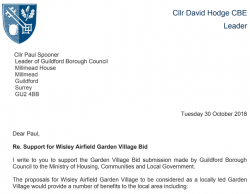 Abraham Lincoln
If given the truth, the people can be depended upon to meet any national crisis...
Abraham Lincoln
If given the truth, the people can be depended upon to meet any national crisis...
 Guildford news...
for Guildford people, brought to you by Guildford reporters - Guildford's own news service
Guildford news...
for Guildford people, brought to you by Guildford reporters - Guildford's own news service
Letter: Was It Really Just ‘Naive Oversight’ That Caused the Problems with GBC’s Funding Bid?
Published on: 17 Oct, 2019
Updated on: 24 Oct, 2019

The “infamous” SCC letter in support of GBC’s Wisley garden village bid
By Colin Cross,
written as a former Lib Dem and Independent councillor for Lovelace
in response to: ‘Naive Oversight’ Kept Property Agent’s Role in Drafting GBC Report and Letter Hidden
Guildford Borough Council has published an unrestricted summary of a confidential independent review into the origins of a funding bid document and a letter of support from the leader of Surrey County Council for GBC to progress a Garden Village scheme for the former Wisley Airfield site.
Both documents were written following a Ministry of Housing, Communities and Local Government (MHCLG) invitation (in August 2018) to bid for government funding.
The summary, written by GBC’s managing director James Whiteman, of the full investigation report, draws conclusions in an attempt at closure. Whilst it’s a laudable attempt at introducing some transparency into murky waters, it is not comprehensive nor does it have sufficient depth and these shortcomings make it inadequate.
The bid invitation was intended for Local Authorities that own proposed sites and is for developments between 1,500 to 10,000 homes. GBC’s application was opaque in regard to its lack of site ownership and barely reaches the minimum numbers. Furthermore, the bid document consistently misrepresented the validity of the bid by inaccurate statements, e.g:
Page 5, para 3.01 “The proposal for a new Garden Village at Wisley Airfield is included in the emerging GBC Local Plan”.
But GBC’s adopted Local Plan shows “Policy A35 – Former Wisley Airfield”. There is nothing about Garden Village status.
And at para 3.02 “The Garden Village has been demonstrated to be deliverable and viable by the evidence base prepared by GBC”. This is untrue I can’t find such an evidence base.
It is also stated: “The Secretary of State dismissed the site’s Planning Appeal for the key reason that it was within the green belt”.
No, the inspector reported 14 reasons for refusal, including overdevelopment; unworkable cycle and pedestrian networks; sensitive design issues; major fatal failure of the transport infrastructure; effects on locale being “catastrophic”; development scale wholly out of context, and, summing up, he said, “the proposals do not constitute sustainable development”.
Somehow the Garden Village bid document ignored the inspector’s rejection and made a myriad of other misleading remarks. Why? Because GBC did not write the bid but decided Wisley Property Investments Ltd (WPIL) should manage the bid documentation.
WPIL’s main agent, Savills were tasked with this, using Davies Landscape Architects (DLA), a sub-contractor, who had been party to their planning application.
How do we know this? An interrogation of GBC’s Garden Village initiative website showed the “document properties” on the PDF: “File – Wisley Airfield Garden Village bid Nov 2018. Author: Nicola Preen. No. of Pages: 26” (Ms Preen works at DLA and worked on the Wisley project for several years).
Another related query covers the forward written by the former council leader Paul Spooner. It contains the following statements, amongst many that are fulsomely supportive of the development:
“The sites allocation (in the Local Plan) has been informed by an up-to-date, extensive and robust evidence base”
“The site will assist in infrastructure delivery in the borough”
“Extensive preparatory work has already been undertaken on this site and this will inform (a GBC) Masterplan.”
These are surely not the words expected of a council leader who previously, with his council, had flatly rejected this remote site as unsuitable? The whole bid document is riddled with a pre-determination to progress with this site development in its Local Plan despite the previous refusal and the failed appeal.
Later, at a council meeting on October 30, the existence of the bid formally emerged and it was passed with a few hours notice, the Head of Overview and Scrutiny waiving her right to call it in due to its tight deadline, ignoring widespread consternation.
At the December 4 council meeting, Cllr Spooner stated of the GBC bid: “this is a marketing proposal… and only becomes of value if this site is developed within the Local Plan”.
“The primary authors are the Planning Policy Team at GBC… It was put together with materials that were to hand within GBC”.
Again, planning pre-determination is apparent and the true bid authorship hidden.
But what of the accompanying documents? The infamous SCC letter of support has received much publicity but another letter of support from EM3 Local Enterprise Partnership (LEP), has never surfaced. Is it a copy of the SCC letter? If not, who wrote that one?
The SCC letter of support is labelled by Ockham Parish Council as a wholly inaccurate portrayal. Surrey County Council has distanced itself [see: Deputy Leader Admits SCC Does Not Support Wisley Garden Village Proposal]. We know SCC Cllr Furniss (then GBC deputy leader) was involved in obtaining the outgoing SCC leader’s signature. Who obtained the signature from the LEP?
These occurrences were part of a larger pattern of events involving several parties, over a long period and this demands to be fully investigated.
Turning to the review, James Whiteman’s summary remarks, “Savills declined to provide any comment” and “nor is there any evidence of any payment having been made (by GBC)”.
Surely GBC should know whether or not they paid Savills and/or WPIL? Why did Savills refuse to co-operate and why did GBC accept their services without payment, if that was the case? Savills were undoubtedly placed in an invidious position, having to serve two masters on the same project was a clear conflict of interest.
Furthermore, did the independent reviewer interview Cllrs Furniss and Spooner? There is no mention of it in the summary.
And what dialogue was had with Tracey Coleman, head of planning, who was charged with putting together the bid, but then seemingly disregarded it for three months?
Why did Ms Coleman ignore guidance given in the bid application that MHCLG expect the submission of a proposal to have been preceded by a period of engagement? She was cleared to handle this in August and its deadline was 9 November, so why was MHCLG contacted far too late on 5 November.
Much remains unresolved and we still need conclusive answers covering GBC’s bid motivations and its loss of objectivity. Further investigation is required to unravel GBC’s working relationships with WPIL, Savills, the LEP and SCC.
Have GBC displayed a continuing pre-determination towards progressing the Wisley site? A truly independent investigation is required, or perhaps it should be passed to the Local Government Ombudsman?
The assumption that none of the seven Nolan Principles have been breached has not been proved by what is contained in the summary. There remain serious questions around compliance with the principles: integrity, accountability, openness, honesty and leadership.
Responses to Letter: Was It Really Just ‘Naive Oversight’ That Caused the Problems with GBC’s Funding Bid?
Leave a Comment Cancel reply
Please see our comments policy. All comments are moderated and may take time to appear. Full names, or at least initial and surname, must be given.Recent Articles
- Brutal Thieves Slaughter Animal for Its Meat Which Could Cause Sickness If Eaten
- Highways Bulletin May 19 – Protecting Wildlife During Roadworks
- Letter: It Would Be Good to Have Wind Turbines on the North and South Downs
- Letter: CIL Victims Deserve an Apology and Their Money Back
- 30 Objections Received on South Guildford Garden Infill Proposal
- Ash Residents Come Together To Counter Catapult Attacks On Canal Wildlife
- Notice: Guildford Homestay
- Letter: Cowardly Attacks on Wildlife Have Got To Be Stopped
- Angry CIL ‘Debtors’ Thanked for Their Patience by Waverley Council
- Letter: If the Shalford Councillor Wants Wind Turbines Put Them in Shalford


Recent Comments
- Tony Draycott on Letter: House of Fraser’s Closure Was the Last Straw
- R Wong on Angry CIL ‘Debtors’ Thanked for Their Patience by Waverley Council
- Paul Robinson on Ash Residents Come Together To Counter Catapult Attacks On Canal Wildlife
- J Crawford on Angry CIL ‘Debtors’ Thanked for Their Patience by Waverley Council
- Brian Quinn on Angry CIL ‘Debtors’ Thanked for Their Patience by Waverley Council
- Rainee Wornham on This Year’s Guildford Fireworks Night By the Lions Could Be the Last
Search in Site
Media Gallery
Dragon Interview: Local Artist Leaves Her Mark At One of England’s Most Historic Buildings
January 21, 2023 / No Comment / Read MoreDragon Interview: Lib Dem Planning Chair: ‘Current Policy Doesn’t Work for Local People’
January 19, 2023 / No Comment / Read MoreA3 Tunnel in Guildford ‘Necessary’ for New Homes, Says Guildford’s MP
January 10, 2023 / No Comment / Read More‘Madness’ for London Road Scheme to Go Ahead Against ‘Huge Opposition’, Says SCC Leader
January 6, 2023 / No Comment / Read MoreCouncillor’s Son Starts Campaign for More Consultation on North Street Plan
December 30, 2022 / No Comment / Read MoreCounty Council Climbs Down Over London Road Works – Further ‘Engagement’ Period Announced
December 14, 2022 / No Comment / Read MoreDragon Interview: GBC Reaction to the Government’s Expected Decision to Relax Housing Targets
December 7, 2022 / No Comment / Read MoreHow Can Our Town Centre Businesses Recover? Watch the Shop Front Debate
May 18, 2020 / No Comment / Read More










Jim Allen
October 17, 2019 at 8:26 pm
Investigation by Cllr Colin Cross – game, set and match. Well documented.
Anthony Edwards
October 18, 2019 at 10:08 am
Cllr Colin Cross, of course, reflects the views of many of us with his suggestion that there should be a truly independent investigation and review into GBC’s working relationship with WPIL and Savills. GBC has earned a well-deserved reputation – well beyond the borough – for doubtful goings-on. How many boroughs can boast success in winning Private Eye’s ‘Rotten Borough of the Year’ award following a series of reports of doubtful and criminal activity? And it looks like it might be on course for future accolades of a curiously similar nature.
RWL Davies
October 19, 2019 at 6:30 am
On the face of it an excellent forensic examination and a sound conclusion – “There remain serious questions around compliance with the principles: integrity, accountability, openness, honesty and leadership.” – no surprises there then.